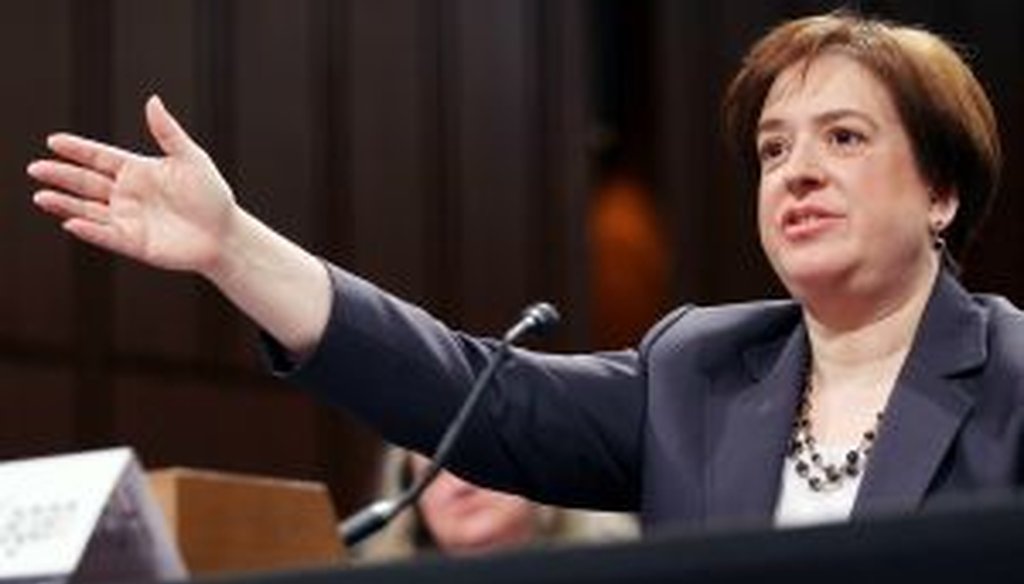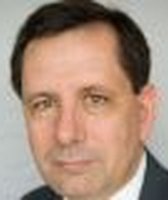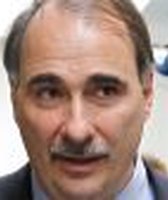Stand up for the facts!
Our only agenda is to publish the truth so you can be an informed participant in democracy.
We need your help.
I would like to contribute

Elena Kagan testifies before the U.S. Senate Judiciary Committee on June 29, 2010.
Last updated June 29, 2010, 7:08 p.m.
The Senate Judiciary Committee has concluded its second day of hearings on Elena Kagan's nomination to the U.S. Supreme Court. President Obama announced her as his choice for the court in May.
For a little more than a year, Kagan has served as Obama's solicitor general, the attorney who represents the U.S. government before the Supreme Court and decides which legal arguments the government will present. The job is important enough that legal experts sometimes refer to the solicitor general as the tenth justice. (For more on Kagan's biography, read our previous story, Fact-checking the claims on Elena Kagan.)
The hearings will likely cover a range of issues from the role of the Supreme Court in deciding laws, the limits of executive power, hot-button social issues like abortion and gay rights, and Kagan's own views on judicial philosophy.
We're watching the hearings closely. Here are the fact-checks we've done so far.
• Sen. Jeff Sessions questioned Kagan's views on freedom of speech. "In her first appellate argument, Ms. Kagan told the court that the speech and press guarantees in the First Amendment would allow the federal government to ban the publication of pamphlets discussing political issues before an election," Sessions said. We found that Sessions left out the details: Kagan was arguing against corporations spending unlimited sums to influence an election. We rated his statement Half True.
• We looked at whether Kagan had changed her views from what she espoused in a 1995 law review article. Back then, she said Supreme Court nominees should be more forthcoming in discussing their views during Senate hearings. Fast forward to 2010, and Kagan said she had re-thought some of her previous statements. We gave her a Full Flop on the Flip-O-Meter.
• Sen. Jon Kyl on Monday said that "the (American Bar Association's) own criteria for a judicial nominee call for, among other things, at least 12 years' experience in the practice of law, and they mean actual practice of law." Kagan wouldn't meet that standard. We concluded that Kyl reported the ABA's standards correctly, but ignored a way that Kagan and others in a similar situation could still score highly in the rating system.
In addition, here's a summary of the fact-checks we published about Kagan prior to the beginning of her hearings. Many of these claims were repeated by Republican senators in their opening statements.
• New York Times columnist David Brooks wrote that Kagan's professional writings were limited and unadventurous. Elena Kagan "has published five scholarly review articles, mostly on administrative law and the First Amendment. These articles were mostly on technical and procedural issues." We read other reports that named a different number of articles. We delved into Kagan's writings and found there are several different ways to calculate how many law review articles Kagan has written. We rated his statement Half True.
• Sen. John Barrasso questioned Kagan's nomination, particularly her actions toward military recruiters when she was the dean of Harvard Law School. As dean, Kagan took a lead role in trying to keep military recruiters off campus because of the "Don't Ask, Don't Tell" policy that prevents gays and lesbians from serving openly in the military. Kagan said at the time that the policy was discrimination, and that schools should be able to keep the recruiters off campus. Barrasso said that "the Supreme Court ruled unanimously that she was wrong." The Supreme Court did say schools had to allow recruiters if they wanted to get federal funding, so we ruled Barrasso's statement True.
• Sen. Patrick Leahy defended Kagan's nomination against criticism about how she handled the military recruiters, particularly that her position was harmful to the military. Military "recruiting went on at Harvard every single day throughout the time (Kagan) was there," Leahy said. We found that there were some limitations on recruiters, so we rated Leahy's statement Half True.
• Sen. Jeff Sessions, on the other hand, said that Kagan's actions "violated the law of the United States at various points" with her opposition to military recruiters. We found that Kagan didn't willfully flout the law after the Supreme Court made the law unmistakably clear. So we rated Sessions' statement Barely True.
• Radio talk show host Michael Savage said Elena Kagan is "a New York City radical, Marxist lawyer through and through." We looked into the evidence and found that to be off-base and inaccurate. Kagan wrote a paper about socialism in college, but she never said in the thesis that she subscribed to the political ideas of socialism. So we rated his statement Pants on Fire.
• Savage also said that "She took money from Goldman Sachs just like her boss, Obama." Our research showed Kagan was a member of the advisory council for the Goldman Sachs Global Markets Institute while she was dean at Harvard Law School. In 2008, according to financial disclosure forms filed with the Senate committee, she was paid a stipend of $10,000 for her services. We found that was very different from the campaign contributions that then candidate Barack Obama accepted from employees of Goldman Sachs. So we rated Savage's statement Half True.
• Sen. John Cornyn said that Kagan's experiences were too narrow. "Ms. Kagan has spent her entire professional career in Harvard Square, Hyde Park and the D.C. Beltway," he said. PolitiFact Texas looked into Kagan's resume and found that she has spent her career in Cambridge, Mass.; Chicago; and Washington, D.C. So we rated Cornyn's statement True.
Our Sources
See individual item for sources.












































